JFK Revisited: Through the Looking Glass Blu-ray Movie
HomeJFK Revisited: Through the Looking Glass Blu-ray Movie 
Blu-ray + DVDShout Factory | 2021 | 2 Movies | 360 min | Rated TV-14 | Jul 19, 2022
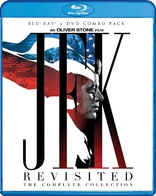
Movie rating
7.3 | / 10 |
Blu-ray rating
| Users | 5.0 | |
| Reviewer | 5.0 | |
| Overall | 5.0 |
Overview
JFK Revisited: Through the Looking Glass (2021)
Declassified files related to President Kennedy's assassination in a far larger context, aiming to shine more light on what really happened in 1963.
Starring: Oliver StoneNarrator: Donald Sutherland, Whoopi Goldberg
Director: Oliver Stone
| Documentary | Uncertain |
| History | Uncertain |
Specifications
Video
Video codec: MPEG-4 AVC
Video resolution: 1080p
Aspect ratio: 1.78:1, 1.33:1
Original aspect ratio: 1.78:1, 1.33:1
Audio
English: DTS-HD Master Audio 5.1 (48kHz, 24-bit)
English: DTS-HD Master Audio 2.0 (48kHz, 24-bit)
Subtitles
English SDH
Discs
Blu-ray Disc
Four-disc set (2 BDs, 2 DVDs)
DVD copy
Playback
Region A (locked)
Review
Rating summary
| Movie | 5.0 | |
| Video | 4.5 | |
| Audio | 4.5 | |
| Extras | 2.5 | |
| Overall | 5.0 |
JFK Revisited: Through the Looking Glass Blu-ray Movie Review
Reviewed by Dr. Stephen Larson July 23, 2022In November 2013, Oliver Stone and his producer Rob Wilson watched closely the national TV networks' coverage commemorating the 50th anniversary of President Kennedy's assassination. Stone and Wilson reacted with shame and dismay at how the mainstream media were still trumpeting the lone assassin myth. It's as if journalists were still living in 1964 when the Warren Commission concluded that Lee Harvey Oswald acted along without any trace of conspiracy. The cinematic rhetoric of Stone's 1991 feature JFK functioned as a counter-myth to the commission's conclusions. The epilogue called for opening thousands of files kept locked by US governmental agencies. JFK caused a firestorm of controversy across America and compelled President George H. W. Bush to sign The JFK Assassination Records Collection Act of 1992. Stone testified on Capitol Hill where he lobbied congress to declassify long-suppressed documents. A few years later, President Clinton appointed five members to the Assassination Records Review Board (ARRB), an independent agency responsible for overseeing the identification and release of JFK files. Though the board helped to release pages in the hundreds of thousands, the media largely ignored their content and published few stories with little fanfare.
I also tuned into airings that November and essentially had the same reaction as Stone and Wilson. In addition, I watched so-called documentaries on the History Channel and Discovery Channel which purported to accurately recreate the shooting in Dealey Plaza. These fanciful productions were made with a technical proficiency that attempted to lead a lay viewer into believing that Oswald could get off three shots from the sixth-floor window of the Texas School Book Depository. One part of Stone's two-hour JFK Revisited: Through the Looking Glass and four-hour documentary miniseries JFK: Destiny Betrayed examines Arlen Specter's "magic bullet theory" that a single bullet could have penetrated both Kennedy and Texas Gov. John Connally and emerge pristine. This segment shatters any possibility of that occurring and will hopefully lay the single-bullet myth to rest forever.
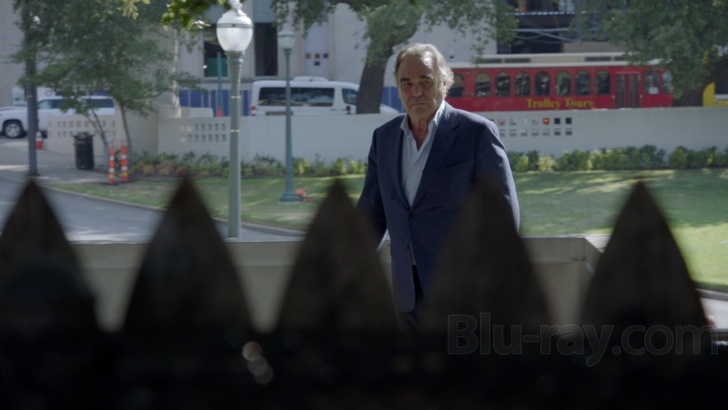
A dramatist revisits the crime scene and the site of his 1991 film, JFK.
The two versions contained in JFK Revisited: The Complete Collection feature at least thirty interviewees who have varied expertise in JFK's autopsy, ballistics and forensic evidence, a witness whose testimony was altered by the WC, prior assassination attempts on Kennedy in early November '63, JFK's foreign policy, and Oswald's dealings with the Student Revolutionary Directorate (DRE). Since JFK's narrative centered around key figures in New Orleans as part of New Orleans DA Jim Garrison's probe, Stone delivers a relatively brief section on Clay Shaw, David Ferrie, and Guy Banister, with a few "new" nuggets about these principals. The ARRB brought out numerous revelations about the severely flawed autopsy done on wounds sustained to Kennedy's head and neck. (There were two brain exams!) We hear from ARRB Chair John R. Tunheim, ARRB Deputy Director Thomas Samoluk, and ARRB military records analyst Douglas Horne. The latter authored a five-volume work on the assassination and previously appeared in Stephen Goetsch's 2015 documentary, A Coup in Camelot. Horne is always full of details and I love how he imitates the recollections of Dr. George Burkley, JFK's personal physician. JFK Revisited and the miniseries deliver a thorough dissection of at least one bullet's damage to Kennedy's right parietal area and occipital lobe. Stone and DiEugenio interview renowned medical professionals Gary Aguilar, Henry C. Lee, David Mantik, and Cyril H. Wecht. One important thing I learned about the spurious autopsy is that artificial hair was apparently implanted on JFK's scalp! Is the publicly available autopsy photograph really of Kennedy's head? It seems another model could have been sculpted.
Like JFK, Stone frames his Kennedy documentary as a "whydunit." He devotes significant coverage, particularly in the miniseries, to the 35th President's ongoing battles with the CIA, Joint Chiefs of Staff, and national security establishment. The film argues convincingly that Kennedy wanted a détente with USSR premier Nikita Khrushchev and Cuban premier Fidel Castro. It shows how the planning for the Bay of Pigs essentially originated in the later stages of President Eisenhower's second term. Maj. John Newman (author of JFK and Vietnam and a multi-volume JFK assassination series) explains how Kennedy never intended to send ground troops to Vietnam. One highlight of the foreign policy focus is JFK's support of the African nationalist movement. Richard Mahoney and David Talbot go into great depth about Kennedy's willingness to work with Congolese leader Patrice Lumumba. Talbot reveals the terrible anguish JFK felt when he learned of Lumumba's murder. The photograph of the president covering the right half of his face upon this news is displayed on the front dust jacket of Mahoney's JFK: Ordeal in Africa, a 1983 book that's unfortunately out of print and hopefully will be reissued some day.
Note: The beginning of JFK Revisited features substantial archival footage of that fateful day in Dallas while JFK: Destiny Betrayed doesn't feature that much of it. The reason is that for the shorter feature, Stone has sought to give neophytes and those less familiar with the assassination a sufficiently detailed overview of important moments. Kennedy's "peace speech," arguably his greatest speech and which he delivered at American University, is shown at the beginning of JFK Revisited. It's excerpted in the middle and towards the end of Episode 4 to accommodate the filmmakers' dramatic focus.
JFK Revisited: Through the Looking Glass Blu-ray Movie, Video Quality 
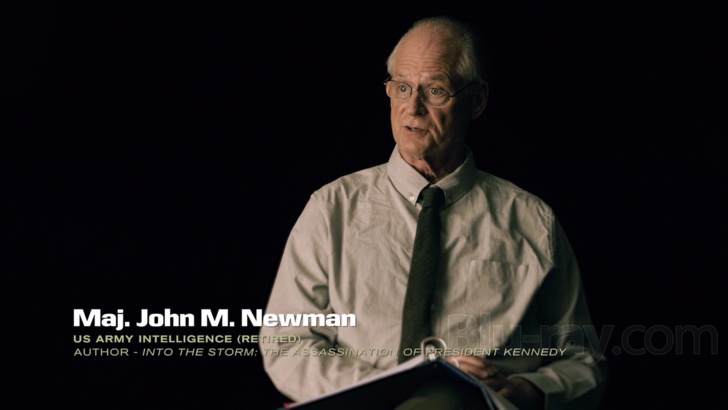
JFK Revisited: The Complete Collection has been released by Shout! Studios in the US and comes with four discs: two BD-50s and two DVD-9s. Fortunately, Shout! has included the two-hour feature and four-hour series on each format's disc. JFK Revisited: Through the Looking Glass employs the MPEG-4 AVC encode on a BD-50 (disc size: 38.51 GB) and carries an average video bitrate of 34000 kbps. JFK: Destiny Betrayed's BD-50 (disc size: 46.11 GB) utilizes the same encode and boasts a mean video bitrate of 19989 kbps. Each version presents the ca. 2019 footage in 1.78:1 while stock footage is displayed in 1.33:1. After working together on a dozen features, Stone and legendary cinematographer Robert Richardson reunite for the first time since U-Turn (1997). (Richardson was scheduled to photograph Stone's Pinkville in 2007 but sadly production was halted due to the WGA strike.) Stone says in the commentary that he wanted to film his interviewed subjects in the same style as Warren Beatty's Reds (1981). As you can see in these screenshots, they are often framed in medium shots and medium close-ups. Richardson's camera occasionally gets up close (see frame grab #16). When he frames from the side, Richardson always captures an interviewee from his left side (see frame enlargement #s 17-20). He did a great job of producing a reflection from David Talbot's glasses (#19). He definitely goes Gordon Willis at times by using very minimal light on faces.
The number of a/v archival sources is almost innumerable. The Untold History of the United States (2013) also incorporates a ton of stock footage. While JFK pulled in many external non-diegetic sources, Nixon (1995) arguably took it to another level. The remastered color footage (mostly from the 1960s) looks quite sharp with minimal film artifacts (e.g., see Screenshot #s 27-33). Some of the vintage TV programs that are excerpted are noticeably hazier and blurrier but the technical authors of the discs can't be faulted.
Shout! includes twelve scene selections for JFK Revisited. Each individual chapter of the mini-series generally contains seven scene selections but you can't pick them from a popup menu. They are all remote generated.
JFK Revisited: Through the Looking Glass Blu-ray Movie, Audio Quality 
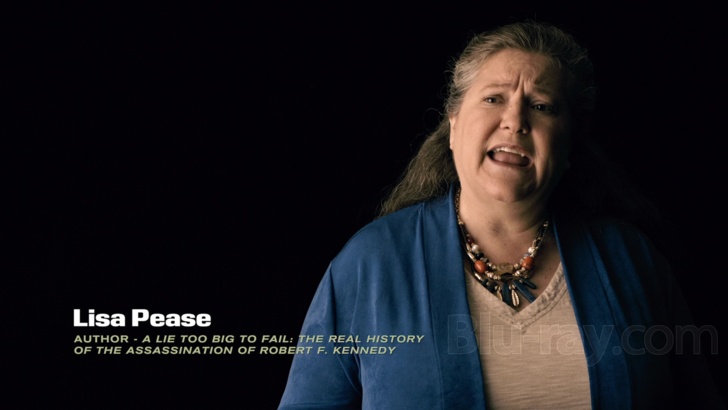
JFK Revisited contains a DTS-HD Master Audio 5.1 Surround mix (3061 kbps, 24-bit) and a downsampled DTS-HD Master Audio 2.0 Stereo (1636 kbps, 24-bit). I've listened to both and prefer the 5.1 track because it makes active use of Jeff Beal's underscore and very occasional sound effects (such as gunshots). JFK: Destiny Betrayed also includes lossless 5.1 and 2.0 tracks with a lower bitrate for the surround mix. Whoopi Goldberg narrates and her voice enunciates the words clearly. Donald Sutherland, who played the mysterious "Mr. X" in JFK, returns here to narrate the foreign policy section. While his voice cracks, it's great to have him back. All of the contemporary interviews are conducted in English. There is some Spanish in the archival footage and that is subtitled (see Carlos Bringuier in capture #40). Non-English words have auto-generated English subs. If you select the English SDH from the menu, it will subtitle everything.
Beal's score blends classical and jazz. He employs a string ostinato for the cue, "The Warren Commission," which works very well. My favorite piece on the 100-minute digital album as well as on the four-hour version is "Searching for Answers." It features light piano, military drums in the background, horns, and strings. It's very contemplative and plays while on-screen images of historical figures are deep in thought or appear pensive. Its style immediately reminded me of the piece "Reagan" by Danny Elfman from Errol Morris's The Unknown Known (2013). John Williams's "Prologue" and "The Conspirators" from the 1991 Elektra soundtrack album for JFK play over the main titles for the series' episodes.
JFK Revisited: Through the Looking Glass Blu-ray Movie, Special Features and Extras 
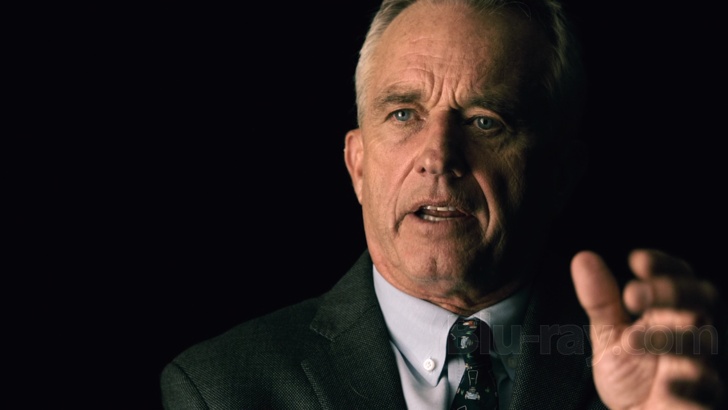
Blu-ray Disc 1: JFK Revisited: Through the Looking Glass (1:57:28; 1080p)
- NEW Audio Commentary by Director Oliver Stone and Writer James DiEugenio - Stone discusses with DiEugenio the circumstances that led to the impetus for making JFK Revisited. The two also talk about the interviewed subjects they selected and the credentials that made them well-qualified to comment on the program's topoi. Stone is understandably angry over the ineptitude of the original investigation and the national media's coverup ever since '63. DiEugenio speaks with great astonishment about the potential great leads that the Warren Commission missed out on or chose not to pursue. Stone talks for roughly 55 percent of the track. Director and writer were recorded together. In English, not subtitled.
- Trailer (2:15, 1080p) - Shout! Studio's official trailer for JFK Revisited. The archival footage is shown in 1.33:1 while recently filmed material is presented in 1.78:1. This also employs the MPEG-4 encode (average video bitrate: 31824 kbps) with a DTS-HD Master Audio 2.0 Stereo sound track (1889 kbps, 24-bit).
Blu-ray Disc 2: JFK: Destiny Betrayed (in four parts: [1] 59:09 + [2] 58:46 + [3] 57:59 + [4] 57:58 = 3:53:54; all 1080p)
JFK Revisited: Through the Looking Glass Blu-ray Movie, Overall Score and Recommendation 

The feature and documentary miniseries contained in Shout! Studios' Blu-ray/DVD combo of JFK Revisited: The Complete Collection have to be the most factually accurate programs produced about the assassination. I was immediately engrossed on my first viewings and plan to watch each many times over. I would also highly recommend picking up Skyhorse Publishing's hardback of JFK Revisited: Through the Looking Glass. It includes the complete text of the screenplays and interview transcripts from the two versions. It also reproduces the unabridged transcripts with the interviewees, containing much material that didn't make it into either cut! The book's content and organization are assembled in a similar manner as JFK: The Book of the Film (1992, Applause Books) and Nixon:An Oliver Stone Film (1995, Hyperion). Stone and DiEugenio also contribute an introduction and foreword, respectively. Shout!'s package of JFK Revisited: The Complete Collection earns MY HIGHEST RECOMMENDATION!
Similar titles
Similar titles you might also like

Untold History of the United States
Oliver Stone's
2012-2013

Trinity and Beyond: The Atomic Bomb Movie
70th Anniversary Special Edition
1995

America: The Story of Us
2010

Last Days in Vietnam
American Experience: Last Days in Vietnam
2014

Mankind: The Story of All of Us
2012

Dawson City: Frozen Time
2016

The Dust Bowl
Ken Burns
2012

The War
2007

The Atomic Cafe
1982

Hillary's America
2016

Hell and Back Again
2011

The Roosevelts: An Intimate History
2014

When We Left Earth: The NASA Missions
2007

Clash of the Gods: Complete Season 1
2009

The Men Who Built America
2012

Hearts and Minds
1974

The Gatekeepers
2012

Cave of Forgotten Dreams 3D
2010

Cease Fire 3D
1953

Apollo 11
2019